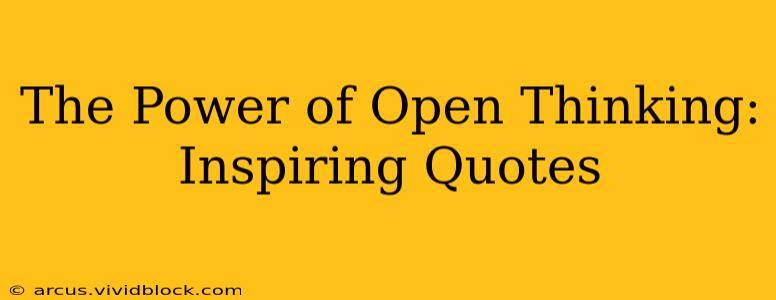Open thinking—the ability to consider different perspectives, challenge assumptions, and embrace new ideas—is a powerful catalyst for personal growth, innovation, and societal progress. It's not simply about agreeing with everything; it's about actively seeking out diverse viewpoints and engaging with them thoughtfully. This ability to approach the world with an open mind is crucial in today's rapidly evolving landscape. This article explores the power of open thinking through inspiring quotes and provides practical strategies to cultivate this vital skill.
What is Open Thinking?
Open thinking isn't about being wishy-washy or lacking conviction. It's about intellectual humility—recognizing that your understanding is incomplete and actively seeking to expand it. It involves:
- Curiosity: A genuine desire to learn and explore new ideas.
- Empathy: The ability to understand and appreciate perspectives different from your own.
- Critical Thinking: Analyzing information objectively, identifying biases, and forming reasoned judgments.
- Flexibility: Being willing to change your mind when presented with compelling evidence.
- Courage: The boldness to challenge established norms and explore unconventional approaches.
Inspiring Quotes on Open Thinking
Many great thinkers have emphasized the importance of open-mindedness. Here are a few inspiring quotes that capture the essence of open thinking:
- "The mind is not a vessel to be filled, but a fire to be kindled." - Plutarch: This quote emphasizes the active and dynamic nature of open thinking. It's not about passively absorbing information but about engaging with it actively and critically.
- "The only true wisdom is in knowing you know nothing." - Socrates: Socrates' famous quote highlights the importance of intellectual humility, a cornerstone of open thinking. Recognizing the limits of your knowledge encourages you to seek out new perspectives.
- "It is the mark of an educated mind to be able to entertain a thought without accepting it." - Aristotle: This quote emphasizes the importance of critical thinking—considering ideas without immediately embracing or rejecting them.
- "The greatest discovery of all time is that a person can change his future by merely changing his attitude." - Oprah Winfrey: This quote links open thinking to personal transformation. By embracing new perspectives, we can change our mindset and unlock new possibilities.
How to Cultivate Open Thinking
Developing open thinking is a journey, not a destination. Here are some practical strategies to help cultivate this crucial skill:
1. Actively Seek Diverse Perspectives:
Make a conscious effort to engage with people from different backgrounds, cultures, and belief systems. Read books and articles that challenge your assumptions. Listen attentively to opposing viewpoints, even if you disagree with them.
2. Question Your Assumptions:
Regularly examine your beliefs and assumptions. Ask yourself: "What evidence supports this belief?" "Are there alternative explanations?" "What are the potential biases influencing my thinking?"
3. Embrace Constructive Criticism:
Don't be defensive when someone offers criticism. See it as an opportunity to learn and grow. Ask clarifying questions and seek to understand their perspective.
4. Practice Empathy:
Try to understand the world from other people's points of view. Put yourself in their shoes and consider the factors that might influence their beliefs and actions.
5. Develop Your Critical Thinking Skills:
Learn to identify logical fallacies, biases, and misleading information. Develop the ability to analyze information objectively and form reasoned judgments.
Frequently Asked Questions (FAQs)
Why is open thinking important?
Open thinking is crucial for personal growth, innovation, and problem-solving. It allows us to see beyond our own limitations, embrace new opportunities, and build stronger relationships.
How can I overcome my biases?
Recognizing your biases is the first step. Actively seek out information that challenges your preconceived notions and be willing to change your mind when presented with compelling evidence.
What are some common barriers to open thinking?
Common barriers include confirmation bias (seeking out information that confirms existing beliefs), cognitive dissonance (the discomfort of holding conflicting beliefs), and fear of being wrong.
Conclusion: Embracing the Power of Open Thinking
Open thinking is a powerful tool for navigating a complex and ever-changing world. By cultivating curiosity, empathy, and critical thinking skills, we can unlock our full potential and create a more inclusive and innovative society. The journey to open thinking is ongoing, but the rewards—both personal and collective—are immeasurable. Embrace the power of an open mind and embark on this transformative journey today.

